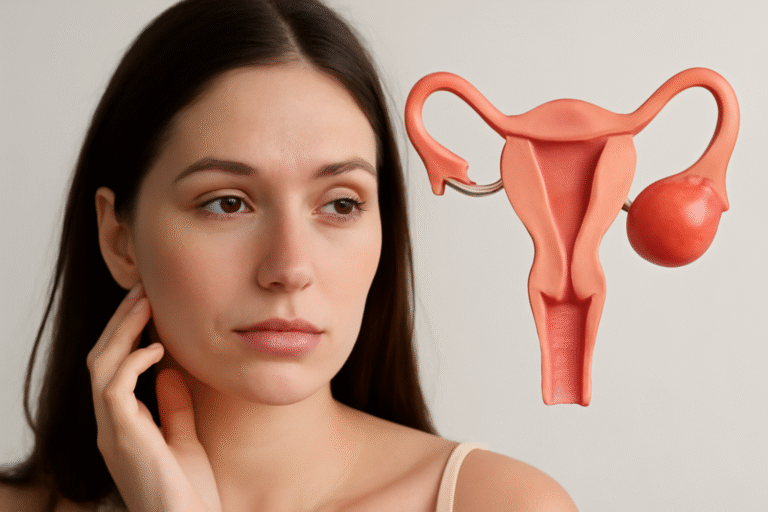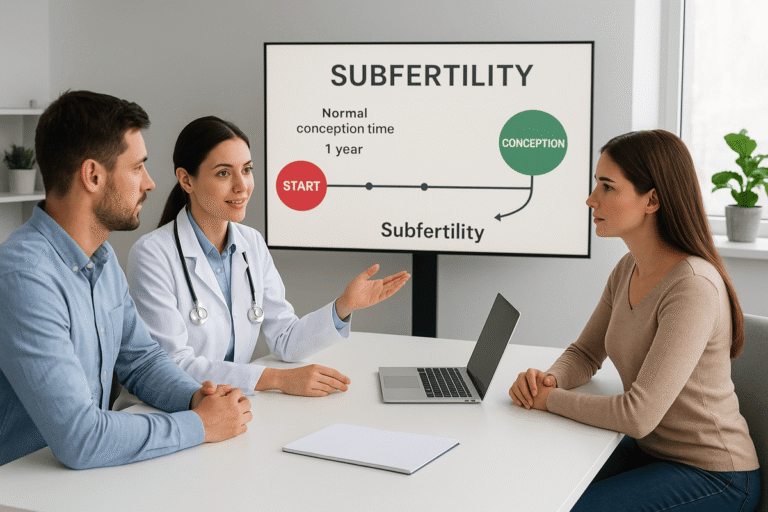A research paper from 2012 in the Journal of Applied and Basic Medical Research found that between 2% and 4% of women of childbearing age have low amounts of thyroid hormones or hypothyroidism. This means that a lot of women have trouble in pregnancy/fertility because of hypothyroidism. To learn more about the risks that can come up before, during, and after giving birth if you have low thyroid hormone levels, keep reading.
Also read: Yoga Poses That May Help Boost Fertility
Pre-Pregnancy
Hypothyroidism and low amounts of thyroid hormones can change a lot about ovulation and periods. High amounts of prolactin happen when thyroxine (T4) levels are low or thyroid-releasing hormone (TRH) levels are high. This can make it so that either no egg comes out during ovulation or the egg comes out at odd times, making it hard to get pregnant.
Hypothyroidism can also make the second half of your period shorter. This might not give a fertilised egg enough time to join with the womb. It can also cause low basal body temperature, high thyroid peroxidase (TPO) antibodies, and cysts in the ovaries, all of which can make it impossible to get pregnant or cause a pregnancy to end.
Before you get pregnant, you should have your TSH and T4 levels checked. Also, if you already have low thyroid hormones or have had a loss, this is very important. A history of thyroid trouble or any other autoimmune disease in your family is a high risk factor. If you deal with your hypothyroid symptoms early on in the planning stages of your pregnancy, you can start treatment right away. This might make things work out better.
Pregnancy
Hypothyroidism has symptoms that are a lot like the signs of early pregnancy. Some signs of hypothyroidism in early pregnancy are:
- extreme tiredness
- weight gain
- sensitivity to cold temperatures
- muscle cramps
- difficulty concentrating
Hypothyroidism is usually treated the same way during pregnancy as it was before getting pregnant. But you should tell your doctor right away if you find out you’re pregnant so you can get the right care and make changes if needed. Every four to six weeks, your doctor will look at your TSH lab results to make sure your hormones are in the right range. During pregnancy, your body needs more thyroid hormones to help you and the baby. Also, keep in mind that the iron and calcium in your prenatal vitamin may get in the way of your body’s ability to use thyroid hormone replacement treatment. That is not going to happen if you take your thyroid medicine and pregnancy vitamin four to five hours apart.
When you are pregnant, your doctor will have to be extra careful with how they treat your hypothyroidism. If it’s not kept under control, it can lead to:
- maternal anemia
- increase in maternal blood pressure
- miscarriage or stillbirth
- low infant birth weight
- premature birth
Your baby’s growth and brain development can also be affected by signs that aren’t under control.
Post-Pregnancy
It’s normal to get postpartum thyroiditis after giving birth. This side effect happens more often in women with autoimmune thyroid disease. Most of the time, postpartum thyroiditis starts in the three to six months following giving birth. This trouble lasts for a few weeks to a few months. Some of the signs can be hard to tell apart from the problems that come with being a parent for the first time.
Postpartum thyroiditis signs may show up in two stages:
- In the first stage, your symptoms may resemble hyperthyroidism. For example, you may be nervous, cranky, have a pounding heartbeat, sudden weight loss, trouble with heat, fatigue, or difficulty sleeping.
- In the second stage, hypothyroid symptoms return. You may have no energy, trouble with cold temperatures, constipation, dry skin, aches and pains, and problems thinking clearly.
A woman with postpartum thyroiditis is not the same as another woman who has it. Women who had high levels of TPO antibodies early in their pregnancy are more likely to get postpartum thyroiditis. This is because their defence system isn’t as strong.
Hypothyroidism can also make it hard to make milk, but this problem usually goes away with the right hormone replacement treatment.
Conclusion
If you are trying to get pregnant and already have a thyroid or autoimmune disease or problems with a previous pregnancy, you should talk to your doctor. Your doctor can get the right tests and make a plan for a safe pregnancy. The earlier you start getting ready, the more likely it is that things will go well. Additionally, don’t forget how important it is to work out daily, eat well, and lower your stress levels.





[…] with endometriosis, polycystic ovary syndrome (PCOS), thyroid imbalances (either hyperthyroidism or hypothyroidism), or diabetes since your last child. In that case, these conditions can directly impact your […]